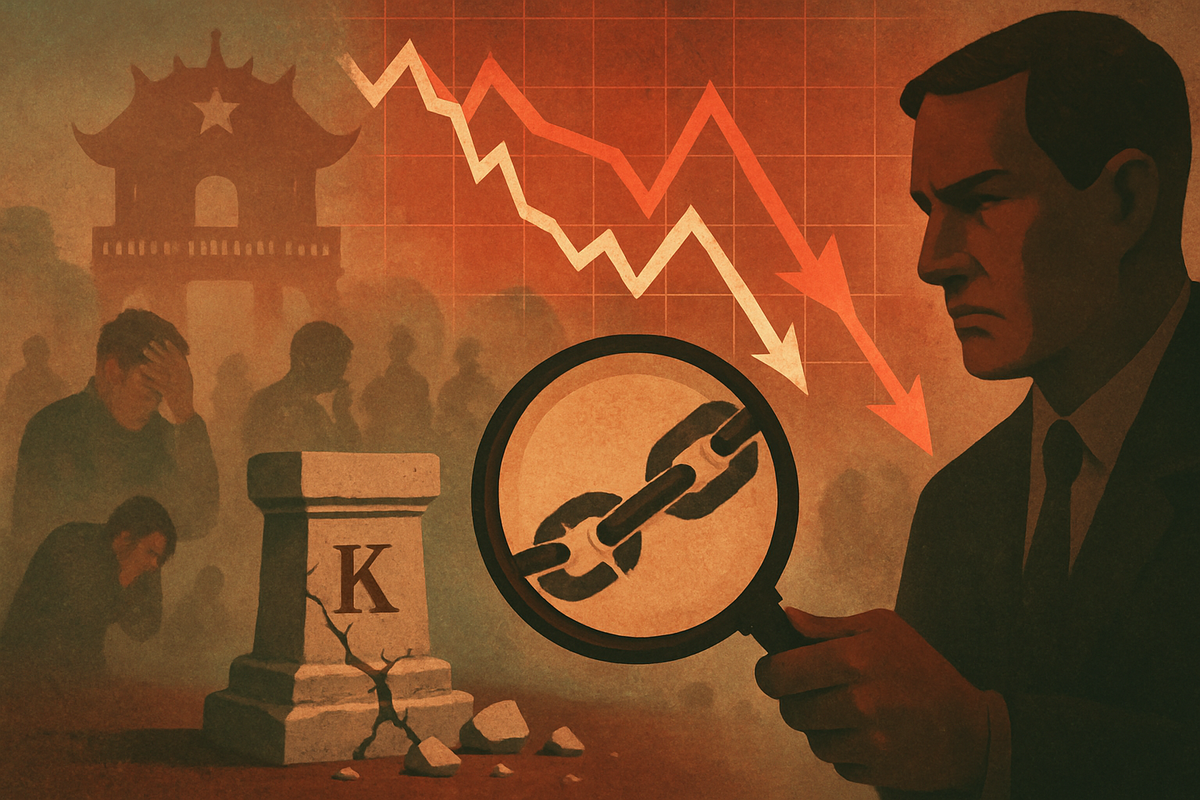
Hanoi, Vietnam – October 20, 2025 – The Vietnamese stock market experienced a dramatic downturn today, with the VN-Index plummeting 5.5%, marking its sharpest single-day decline in six months. This significant fall comes in the wake of a bombshell report from the Government Inspectorate of Vietnam, which revealed widespread violations within the nation's corporate bond market. The revelations have reignited fears of a credit squeeze, particularly in the beleaguered real estate sector, and cast a shadow over Vietnam's aspirations for enhanced emerging market status.
The immediate implications are palpable: investor sentiment has "deteriorated" sharply, leading to concerns about forced selling, especially among retail investors who had increased leverage during a recent market rally. Major companies, including conglomerate Vingroup, its real estate arm Vinhomes, and the state-owned Bank for Foreign Trade of Vietnam, were among the heaviest losers, acting as significant drags on the index. The re-emergence of credit concerns poses a setback for Vietnam, which only recently celebrated its upgrade to secondary emerging-market status by FTSE Russell, an event that was expected to draw substantial foreign investment.
Detailed Coverage: A Deep Dive into the Credit Crisis
The Government Inspectorate's findings, released on Friday, October 17, 2025, exposed numerous irregularities among 67 bond issuers, including five prominent banks. The violations detailed a concerning pattern of illicit activities that have undermined market integrity and liquidity. Specific findings included the misuse of bond proceeds for purposes other than those publicly stated, inadequate disclosures, poor capital management, and delayed principal and interest payments on corporate bonds. Some major commercial banks, such as Asia Commercial Bank (HOSE: ACB) and Military Bank (HOSE: MB), were implicated for misusing bond proceeds designated for medium- and long-term credit to issue short-term loans or for unspecified investment activities.
The timeline leading up to this market shock reveals a crescendo of distress signals. Early 2025 saw persistent concerns about corporate bond defaults, particularly in the real estate and tourism sectors. By June, despite a surge in new bond issuances, four bonds defaulted, signaling deeper liquidity issues. The State Bank of Vietnam (SBV) introduced Circular 23/2025/TT-NHNN in August, aiming to stabilize the credit market. However, the situation intensified in September when CTCP Chứng khoán EVS (HNX: EVS), a major securities firm, alerted regulators to a potential bond default by Công ty TNHH Đầu tư Cam Lâm. Adding to the pre-existing jitters, October brought a series of high-profile arrests, including Nguyen Hoa Binh ("Shark Binh"), chairman of NextTech Group JSC, on fraud charges, and an Australian CEO, Ranjit Prithviraj Thambyrajah of Nam Song Hau Trading Investing Petroleum Joint Stock Company (UPCOM: NSH), for an alleged $4.9 million loan scam. Critically, on October 16, 2025, Novaland Investment Group (HOSE: NVL) failed to pay interest due on over $335 million in convertible bonds, a significant event preceding the Government Inspectorate's damning report on October 17. The cumulative weight of these revelations culminated in today's sharp market decline.
Key players and stakeholders involved in this unfolding crisis include the Government Inspectorate of Vietnam, which conducted the inspections; the State Bank of Vietnam (SBV), now under immense pressure to strengthen oversight and utilize its newly granted powers to provide special loans to distressed banks; and various corporate bond issuers like Novaland Investment Group (HOSE: NVL) and Công ty TNHH Đầu tư Cam Lâm, grappling with liquidity and default issues. Commercial banks such as Asia Commercial Bank (HOSE: ACB), Military Bank (HOSE: MB), and Bank for Foreign Trade of Vietnam (HOSE: VCB) are also under scrutiny due to their exposure and alleged misuse of bond proceeds. Securities firms like CTCP Chứng khoán EVS (HNX: EVS) are on the front lines, reporting defaults. Most importantly, individual investors, many of whom had increased leverage, are now facing significant losses, and tens of thousands are awaiting compensation from past frauds like the Truong My Lan case involving Saigon Commercial Bank (SCB).
Initial market reactions have been overwhelmingly negative. The VN-Index's 5.5% plunge underscored deep investor anxiety. Companies like Vingroup (HOSE: VIC), Vinhomes (HOSE: VHM), and Bank for Foreign Trade of Vietnam (HOSE: VCB) saw substantial declines, pulling the broader market down. Analysts suggest it may take several sessions for the market to stabilize, with the 1,600-point level serving as a critical technical support. The re-emergence of credit concerns is a significant setback for Vietnam's recent FTSE Russell upgrade, reminding global investors of the inherent risks in frontier markets.
Companies on the Brink: Winners and Losers in the Credit Crunch
The Vietnamese credit market crisis has created a challenging environment, particularly for highly leveraged real estate developers, while potentially highlighting the resilience of prudently managed financial institutions.
Real Estate Developers: The Primary Losers
Companies in the real estate sector are among the hardest hit, given their heavy reliance on credit and bond markets for funding, coupled with a freeze in new project financing and declining sales.
- Novaland Investment Group (HOSE: NVL): This major real estate developer is facing severe liquidity issues. Its shares have experienced prolonged "limit down" trading. The company reported a massive inventory of unsold products (VND142 trillion, or 59% of total assets as of H1 2024) and has been forced to delay bond repayments and seek extensions or asset-for-debt swaps. With over VND32.3 trillion in debt maturing within the next 12 months, Novaland's refinancing pressure is immense. Allegations of misusing bond funds and comparisons to China's Evergrande underscore its precarious position.
- Vingroup (HOSE: VIC): As a diversified conglomerate with significant real estate interests through Vinhomes, Vingroup's financial stability is considered shaky. Substantial losses from its electric vehicle arm, VinFast (NASDAQ: VFS), have become a major financial drain, leading to rising borrowing costs (two-year bonds paying 12.5% interest) and a shrinking market capitalization. Vingroup is burdened with $31 billion in liabilities and acts as a guarantor for VinFast's $2.54 billion debt, with over $1.6 billion due in 2025.
- Vinhomes (HOSE: VHM): As Vietnam's largest real estate developer and Vingroup's housing arm, Vinhomes is directly exposed to the property sector's downturn. Its stock has sharply declined, with Q2/2024 profits down by 49.8%. The company faces declining profitability, and three of its major projects are under inspection for planning and tax issues. Its credit quality is closely tied to Vingroup's financial health, making it vulnerable to its parent company's strains.
Construction Companies: The construction sector, intrinsically linked to real estate, is also suffering. Firms like Hoa Binh Construction Group (HOSE: HBC) and Coteccons Construction JSC (HOSE: CTD) have seen substantial plunges in revenue and profits. They are grappling with significant outstanding debts from developers and liquidity shortages, pushing many towards financial distress.
Banking Sector: Navigating a Tightrope
Vietnamese banks have significant exposure to the real estate sector, with real estate credit accounting for 18.5% of total outstanding loans. While bank stocks have declined, some well-managed institutions are better positioned.
- Asia Commercial Bank (HOSE: ACB): ACB stands out for its prudent risk management, strong retail banking focus, and deliberate avoidance of corporate bond investments. It received an 'AA+' credit rating from FiinRatings, boasts a low Non-Performing Loan (NPL) ratio (1.49% in Q3 2024), and a high Current Account Savings Account (CASA) ratio (22.2% in Q3 2024). These factors position ACB for resilience.
- Military Bank (HOSE: MB): MB has demonstrated strong adaptability, maintaining an NPL ratio below 1.2% and achieving a 30.2% profit increase in the first nine months of 2024. Its high Return on Equity (ROE) of 22% and robust CASA rate (36.1% in Q1 2024) provide a stable funding base, suggesting a greater capacity to weather the crisis.
- Bank for Foreign Trade of Vietnam (HOSE: VCB): As one of Vietnam's "Big 4" state-owned banks, Vietcombank benefits from inherent stability and government backing. Despite its stock falling during the downturn, its strong market position and healthy CASA rate (33.2% in Q1 2024) provide a solid foundation, though short-term profitability may face headwinds.
In summary, highly leveraged real estate developers and their associated construction partners are bearing the brunt of the crisis. Conversely, prudently managed banks with strong fundamentals and diversified portfolios, like Asia Commercial Bank (HOSE: ACB) and Military Bank (HOSE: MB), are better equipped to navigate the downturn and potentially emerge stronger.
Wider Significance: A Systemic Test for Vietnam's Financial System
The Vietnamese credit market crisis, exemplified by the colossal Van Thinh Phat fraud and widespread corporate bond violations, represents a critical test for the nation's financial system. This event exposes deep-seated vulnerabilities and highlights several broader industry trends.
One significant trend is Vietnam's over-reliance on real estate and speculation. The crisis has revealed extensive banking sector exposure to the property market, fueling a speculative bubble where developers promised luxury towers with insufficient backing and families mortgaged their wealth into multiple homes. Residential sales in major cities have plummeted by over 60%, leaving many construction sites abandoned. Complementing this is the problematic growth of a largely unregulated "shadow bond market," where developers issued over US$70 billion in private corporate bonds, with more than 40% now in or near default. This market, characterized by lax disclosure, became a conduit for speculative investment. Consequently, the banking sector faces elevated credit risk and tightened liquidity, with rising non-performing loans (NPLs) leading Moody's to downgrade Vietnam's banking sector outlook from positive to stable. This crisis is also a high-profile case within Vietnam's intensified national anti-corruption "Blazing Furnace" campaign, which aims to purge corruption across various sectors.
The ripple effects are substantial. Domestically, there is a loss of public confidence as tens of thousands of citizens lost savings, leading to a liquidity squeeze, slower credit growth for SMEs, and stagnation in the real estate market. Regionally, while Vietnam's limited foreign debt exposure means less risk of significant international contagion compared to past crises, the deepening financial links within the ASEAN+3 region mean a shock in one economy can still spill over. Financial hubs like Hong Kong and Singapore are particularly susceptible. The crisis could also lead some foreign investors to adopt a more cautious approach, especially for large-scale, long-term projects, despite Vietnam's continued attractiveness for Foreign Direct Investment (FDI).
In response, the Vietnamese government has implemented significant regulatory and policy changes. The State Bank of Vietnam (SBV) has provided an unprecedented "special loan" of US$24 billion to Saigon Commercial Bank (SCB) and has been granted new discretion to provide special, unsecured, zero-interest loans to distressed banks, accelerating crisis response. Sweeping legislative reforms, effective October 2025, also grant commercial banks the right to seize and liquidate collateral assets for non-performing loans, streamlining bad debt resolution. Furthermore, Vietnam has lifted the foreign ownership cap for certain banks that acquire struggling institutions from 30% to 49% to attract capital and facilitate restructuring. There are also strong calls for enhanced transparency in the corporate bond market to rebuild investor confidence.
Historically, the current crisis shares some parallels with past financial events. While Vietnam was less affected by the 1997 Asian Financial Crisis due to its limited global integration, the current situation shows that as Vietnam's economy integrates more globally, its vulnerability to such shocks increases. It also echoes domestic banking crises of 2011-2013, where the SBV imposed credit growth ceilings and interventions to stabilize the system. The real estate turmoil has drawn comparisons to China's Evergrande default, underscoring concerns about systemic risks from overleveraged property developers in politically and economically similar emerging markets. The government's robust regulatory reforms and central bank interventions demonstrate a commitment to addressing these issues, drawing on lessons from past crises to fortify the financial system.
What Comes Next: Navigating Recovery and Growth
The Vietnamese credit and stock markets are poised for a period of stabilization and potential growth, despite the recent turbulence. The outlook is largely positive, supported by robust government intervention, resilient economic fundamentals, and ongoing market reforms.
In the short-term (late 2025 - early 2026), the credit market is expected to stabilize and gradually improve, driven by government policies supporting economic activity and public spending. Corporate bond default rates are projected to decline as corporate cash flows improve and refinancing becomes more accessible. The State Bank of Vietnam (SBV) is maintaining an accommodative monetary policy with low operating interest rates and extended loan moratorium programs, aiming for a higher credit growth target of 16-18% for 2025. However, challenges persist, including high corporate leverage and potential limitations on the SBV's ability to manage currency volatility due to lower foreign reserves, which could lead to higher interest rates if outflows increase. The stock market is anticipated to maintain positive momentum, with 2025 projected as a breakout year. The FTSE Russell upgrade to secondary emerging market status, effective September 21, 2026, is a major catalyst, expected to attract significant foreign capital inflows (estimated at US$1.6 billion from passive ETFs alone). Corporate earnings are forecasted to grow robustly by 18-20% in 2025, driven by broad economic recovery.
Looking at the long-term (2026 and beyond), Vietnam's financial sector is expected to strengthen through ongoing institutional reforms and enhanced regulatory frameworks. Revisions to the 2024 Credit Institution Law aim to improve banks' ability to recover bad debts and empower the SBV in managing struggling institutions. Financial institutions have opportunities to diversify credit exposure beyond real estate to high-growth domestic sectors. The stock market is expected to transition into sustainable expansion, with Vietnam aiming for MSCI Emerging Market status by 2030 and Advanced Emerging Market status by FTSE Russell by the same year, potentially unlocking substantial capital inflows ranging from US$5 billion to US$25 billion. Infrastructure upgrades, including the KRX system in 2025, and reforms like removing pre-funding requirements for foreign investors, are crucial for market development.
Strategic pivots or adaptations are essential. Financial institutions must shift from aggressive balance sheet expansion to quality-driven strategies and diversify credit portfolios beyond real estate. Businesses, particularly in real estate, need to strengthen balance sheets, resolve legal impediments, and adapt to evolving trade policies. Investors are advised to adopt a long-term perspective, leveraging Vietnam's strong economic growth projections and market upgrade potential, accumulating stocks during market corrections.
Market opportunities include the banking sector leading stock market growth, increased public investment boosting construction and infrastructure, a gradual real estate recovery, and significant potential in digital finance. The emerging market status is a major draw for foreign capital. However, challenges remain, such as exchange rate volatility, persistent high corporate leverage, slower legal approvals due to intensified anti-corruption efforts, global economic headwinds, and the continuous need to meet criteria for maintaining market upgrade status.
Potential scenarios range from an optimistic outlook with the VN-Index reaching 1,500-1,670 points (or even 1,750-1,800 by 2026) driven by strong economic recovery and successful market upgrade, to a baseline scenario of moderate growth (VN-Index in the 1,400-1,420 range for 2025), and a less favorable scenario where persistent global uncertainties or a slower real estate recovery could see the VN-Index dip lower. The government's intensified anti-corruption campaign and proactive monetary and fiscal policies, alongside capital market reforms, are crucial in shaping these outcomes. Market sentiment, while generally optimistic for 2025, remains sensitive to negative news.
Wrap-up: Navigating Towards a More Resilient Future
The recent sharp fall in Vietnamese stocks, triggered by revelations of widespread credit market violations, underscores the intricate and often volatile relationship between the nation's real estate, banking, and securities markets. This event, while painful, serves as a critical juncture for Vietnam's financial system, pushing it towards greater transparency and resilience.
Key takeaways from this period of turmoil highlight the strong interconnectedness of Vietnam's financial sectors, where problems in one quickly spill over. It exposed significant regulatory gaps in the private corporate bond market, which facilitated speculative activities and opaque financial practices, ultimately leading to substantial losses for many retail investors. Crucially, while the crisis was severe domestically, Vietnam's banking system, with its limited exposure to international financial markets and robust government intervention, has shown a degree of resilience, preventing broader global contagion.
Moving forward, the market assessment is cautiously optimistic. Experts predict a gradual recovery for the real estate market starting from Q2 2024 and extending into 2025, driven by decreasing mortgage rates and new policies aimed at resolving legal roadblocks and easing capital access. Credit fundamentals for real estate developers are expected to improve, leading to a decline in corporate bond defaults. Vietnam's strong overall economic fundamentals, including robust GDP growth, controlled inflation, and increasing foreign direct investment, provide a supportive backdrop. The stock market, despite recent corrections, is anticipated to see continued gains fueled by supportive fiscal and monetary policies, declining lending rates, and prospects of profit recovery.
The lasting impact of this event will likely be an era of enhanced regulatory scrutiny over corporate bond issuance and financial markets, fostering greater transparency and investor protection. Investor behavior is expected to shift, with both institutional and individual investors becoming more cautious and discerning, prioritizing due diligence. The crisis, though painful, could ultimately contribute to the long-term maturation and health of Vietnam's financial and real estate markets by addressing systemic vulnerabilities and fostering more sustainable growth.
Investors in the coming months should watch for:
- Policy Implementation: Closely monitor the implementation of new real estate and corporate bond laws (e.g., Law on Real Estate Business, Law on Housing, effective early 2025) and government policies aimed at supporting the market and easing credit access. These reforms are paramount for sustained recovery.
- Company Fundamentals: Prioritize companies with strong balance sheets, proven track records, and healthy cash flows, particularly in the real estate and banking sectors. Larger, reputable developers are likely to have better access to capital.
- Sectoral Differentiation: Recognize that recovery will be uneven. Segments like affordable housing, residential properties catering to genuine demand, and industrial real estate are expected to perform better.
- Interest Rates and Exchange Rates: Keep an eye on the State Bank of Vietnam's (SBV) monetary policy and global interest rate trends, as well as domestic exchange rate fluctuations, which can impact foreign capital flows and market sentiment.
- Corporate Bond Market Dynamics: While recovery is expected, exercise caution, especially with high-yield bonds. Transparency and adequate disclosure will be crucial for rebuilding confidence.
- Long-Term Growth Potential: Despite short-term challenges, Vietnam's strong economic growth trajectory, expanding middle class, and attractiveness for foreign investment suggest significant long-term potential. A patient, long-term perspective may prove beneficial.
This content is intended for informational purposes only and is not financial advice.





